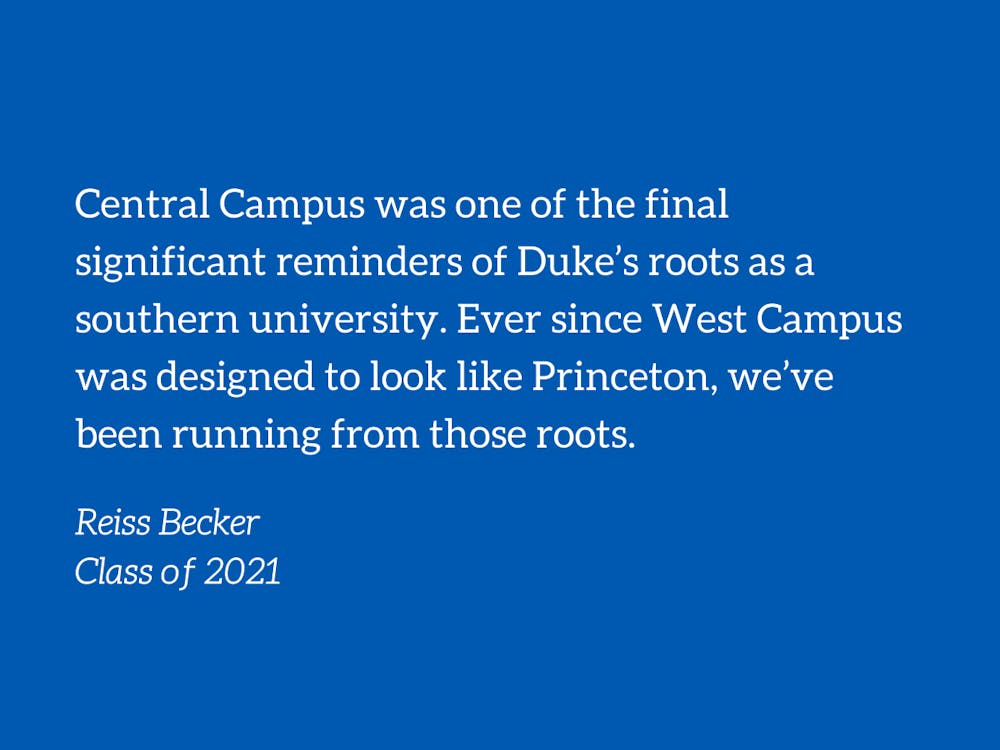At the start of sophomore year, I left my East Campus cocoon behind and struck out for the frontier. Where before I had been swaddled, coddled, beloved and adored as a member of Duke’s latest, greatest (they always tell you that) freshman class, now I was exposed to a grittier Duke, a peripheral Duke, a Duke that was administered with a wink and a nod. That was Central Campus.
Now the memory of Central is fading. Sure, with persistence and a few beers you might persuade a senior to wax poetic about body slamming a pong table at 2AM. Maybe a few juniors, who were but freshmen when Central gave its last gasp, can recall a notable venture or two into Duke’s now-tamed hinterland. But to the sophomores Central was a ghost town when they arrived, a conspicuously abandoned swath of buildings. And for today’s freshmen, Central Campus is just another page in another book and, boy, they’ve been assigned a lot of those since they got here.
So what enduring significance, if any, does Central Campus hold? What does it matter that there was once an expanse of Duke where students lived in independent, walk-up apartments with all the amenities of home, relative autonomy and limited supervision? For starters, it means that Duke tragically destroyed a vast amount of socially distanced, pandemic friendly housing mere months prior to the onset of the coronavirus. Beyond that obvious fact, it also says something deeper about Duke, its trajectory and the psychological impact of closing a “frontier.”
In 1893, three years after the U.S. government declared that the frontier had finally closed, Frederick Jackson Turner authored his famous “frontier thesis.” Therein, he argued that the frontier had made the United States into something more than just another colonial offshoot. The feasibility of exiting the stagnant East and departing for a distant borderland defined equally by peril and possibility was instrumental in shaping a uniquely American culture.
Take Turner’s ambitious theory, twist it a bit and apply it to Duke. Call it Becker’s Frontier Thesis, which is as follows: that Central Campus was one of the final significant reminders of Duke’s roots as a southern university. Ever since West Campus was designed to look like Princeton, we’ve been running from those roots. We are the only school amongst the top 10ish universities that is located in the South. Which explains Duke’s pervasive inferiority complex that permeates our discourse and pollutes our self-perception.
Undoubtedly, Duke is a world class school, sporting amazing personnel (academic, administrative and staff), lavish resources, incredible amenities and exciting opportunities. We’re just not part of the Ivy League. Which certainly makes a material difference in the opinions of a lot of people both on and off campus. We have a good history, one that is both admirable and interesting. We don’t have an august history that extends past the origins of the Republic. We have a lot of impressive alumni, good people who do incredible things. But the alumni of our school do not enjoy a borderline official role within the annals of the American regime. So we feel slightly left out.
Anyways, I was talking about Central Campus, right? Yes, and I left off here: as we tore down Central Campus, we tried to bury Duke’s southern roots in the rubble. Central was a hub of Greek life, a southern institution if ever there was one, and it was the area of campus that came closest to a crude imitation of a fraternity row. This is part of a larger process. This process is why three of our last four Presidents were either worked at or were educated by an Ivy League school. It’s why Greek life is being phased out and a residential college system is being vetted for importation. UNC is ostensibly our rival, but are they our rival when it really counts? When there’s more than basketball on the line? No one thinks about them when it's time to belabor the latest college rankings.
To give the Blue Devil its due, Duke has nearly succeeded at becoming a copy of an elite northeastern Ivy League school. After all, we import half our kids from up there. Many times, I’ve had to explain to friends that, yes, Duke is in the South but it’s not really a southern school. It just feels different.
The battle for Duke’s identity is far from over. Even as we import aspects of the Ivy League, we will always retain the influences of our past and present status as a southern university. But hopefully, going forward we can ditch some of our insecurities, develop the most distinctive Duke we can and be great on our own terms.
Reiss Becker is a Trinity senior. His column “roused rabble” usually runs on alternate Wednesdays.
Get The Chronicle straight to your inbox
Sign up for our weekly newsletter. Cancel at any time.

